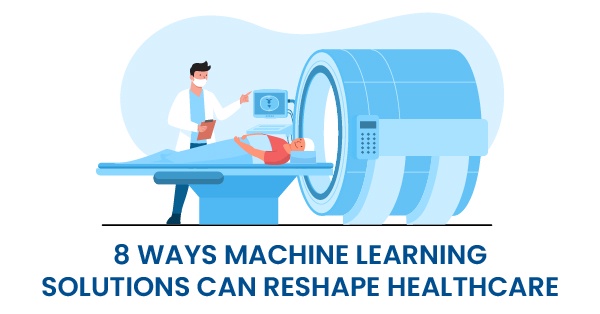The healthcare industry has been facing numerous challenges, ranging from the increasing demand for healthcare services to the rising costs of medical treatments. However, with AI/ML, the industry has found new ways to tackle these challenges and provide better healthcare services to patients.
Machine learning solutions are revolutionizing healthcare with increasing data availability and computing power. Machine learning algorithms can help healthcare providers make faster, more accurate diagnoses, improve patient outcomes, and reduce costs.
Such advanced solutions have revolutionized the healthcare industry in several ways. In this blog, we will discuss how machine learning is transforming the healthcare industry and the future of this technology.
Why Is Machine Learning Vital in the Healthcare Industry?
Medicine will be prepared for new developments as a constantly evolving discipline by incorporating technologies like Artificial Intelligence. However, making predictions about potential pandemics or new epidemics may be the most intriguing implementation of machine learning in healthcare. The COVID-19 pandemic made us aware of how unprepared we were and how susceptible humankind is to the emergence of new diseases.
However, we could use machine learning algorithms to monitor satellite data, news reports, and even social media sources to ascertain how a disease spreads and when it will go viral. This means that healthcare professionals will spend more time caring for patients and less time looking up information.
8 Ways How Machine Learning Solutions Are Revolutionizing the Healthcare Sector
Machine Learning in Medical Imaging:
Medical imaging is an essential tool in healthcare for diagnosing and monitoring diseases. However, interpreting medical images is often complex and time-consuming, requiring highly trained specialists. Machine learning algorithms can help automate and streamline the interpretation of medical images.
For example, computer-aided detection (CAD) systems can analyze medical images to detect abnormalities, such as tumors or fractures, and highlight them for review by a specialist. CAD systems have been shown to increase the accuracy of mammography readings, reducing the number of missed cancers. Additionally, deep learning algorithms can be used to detect and classify a wide range of diseases, from diabetic retinopathy to skin cancer, with high accuracy.
Machine Learning in Electronic Health Records:
Electronic health records (EHRs) contain a wealth of information about patient health and medical history. However, the sheer volume of data can make it challenging for healthcare providers to extract meaningful insights. Machine learning algorithms can help analyze EHR data to identify patterns and trends that can inform treatment decisions and improve patient outcomes.
For example, based on EHR data, machine learning can predict patient outcomes, such as readmission rates. This information can help healthcare providers proactively identify patients at high risk for complications and intervene early to prevent them. ML-based healthcare solutions can also identify patients likely to benefit from specific treatments or interventions, improving the efficiency and effectiveness of care.
Machine Learning in Personalized Medicine:
Personalized medicine aims to tailor treatments to the unique characteristics of each patient. Machine learning algorithms can help healthcare providers identify patients likely to benefit from specific treatments or interventions based on their health data.
For example, machine learning can predict a patient's response to a medication based on their genetic makeup or other factors. This information can help healthcare providers choose the most effective treatment for each patient, reducing the likelihood of adverse reactions and improving patient outcomes.
Machine Learning in Drug Discovery:
Machine learning is revolutionizing drug discovery by helping researchers to identify potential drug candidates more efficiently, predict drug efficacy and interactions, and identify new drug targets. As machine learning technology keeps expanding, it is expected to significantly impact the drug discovery process, accelerating the development of new treatments and improving patient outcomes.
For example, ML algorithms can analyze vast amounts of chemical data to identify potential drug candidates most likely effective in treating a particular disease. It can help in predicting drug interactions, predicting drug efficacy, identifying drug targets, and drug repurposing.
Predictive Analytics:
Machine learning-driven predictive analytics is revolutionizing healthcare by enabling providers to identify patients at high risk of developing chronic diseases or experiencing medical complications, allowing for proactive interventions that improve health outcomes and reduce healthcare costs.
For example, Machine learning solutions can analyze patient data such as medical history, demographics, and social determinants of health to predict the likelihood of a patient being readmitted to the hospital. It can also help with the early detection of chronic diseases, identifying high-risk patients, improving care coordination, and predicting medication adherence.
Medical Research:
Machine learning-driven medical research revolutionizes how medical researchers analyze data, make predictions, and identify new insights that can lead to breakthrough discoveries. For example, Machine learning algorithms can analyze patient data to identify biomarkers and genetic variations associated with specific diseases or conditions.
This allows researchers to develop personalized treatment plans based on a patient's unique genetic profile, increasing the effectiveness of treatment and improving patient outcomes. It can also help with Clinical Trial Design, Disease Diagnosis, and Genomics.
Patient Monitoring:
Machine learning-driven patient monitoring revolutionizes healthcare by enabling healthcare providers to track and analyze patient data in real-time. This allows more accurate and timely interventions that improve patient outcomes.
For example, Machine learning algorithms can analyze patient data in real-time, such as vital signs, lab results, and medication data, to identify patterns that may indicate deterioration in a patient's condition. It also facilitates the healthcare industry for Predictive Analytics, Clinical Decision Support, and patient engagement.
Fraud Detection:
Fraud in the healthcare industry can be a severe problem, leading to significant financial losses and potentially compromising patient care. Machine learning algorithms can detect fraudulent activities in healthcare, enabling providers to identify and prevent fraud more effectively.
Machine learning algorithms can analyze claims data to identify patterns and anomalies indicating fraudulent activity. For example, machine learning can flag claims with unique billing codes, excessive billing, or other suspicious activity. It can be helpful for claims, provider networks, behavioral, and more analysis.
Challenges and Future of Machine Learning in Healthcare
Despite the potential benefits of machine learning solutions in healthcare, some challenges must be addressed. One of the biggest challenges is ensuring the security and privacy of patient data, which is essential in building trust between patients and healthcare providers.
Another challenge is the need for healthcare providers to adapt to new technologies and workflows, which can be time-consuming and require significant investment. Finally, there is a need for healthcare providers to collaborate and share data, which is essential in building effective machine-learning models that can benefit patients.
In the future, machine learning solutions are likely to become even more prevalent in the healthcare industry. As more data becomes available, machine learning algorithms will become more accurate and effective, leading to better patient outcomes and personalized care. Additionally, ML-driven healthcare solutions can help reduce costs and improve efficiency in the medical field, making it more accessible to a broader range of patients.
Conclusion
Machine learning advancements are transforming the healthcare industry, providing healthcare providers with the tools they need to deliver better patient care and support. From improving diagnosis and treatment to streamlining administrative tasks and enhancing the patient experience, machine learning can revolutionize healthcare as we know it. While some challenges still need to be addressed, the future looks bright for ML-based healthcare solutions.


No comments yet